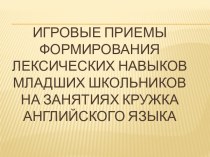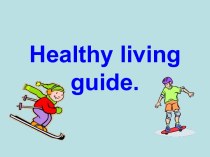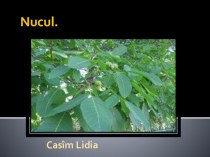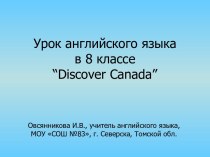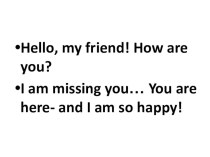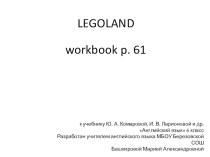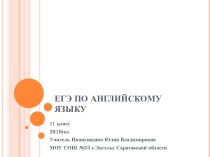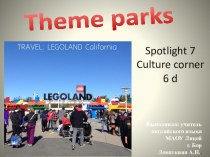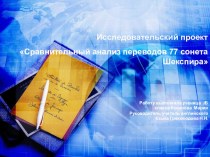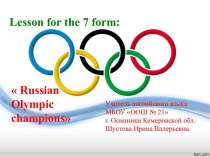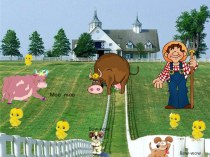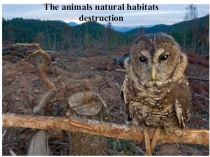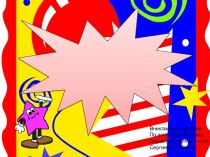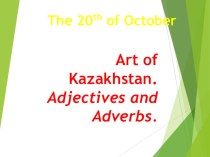- Главная
- Разное
- Бизнес и предпринимательство
- Образование
- Развлечения
- Государство
- Спорт
- Графика
- Культурология
- Еда и кулинария
- Лингвистика
- Религиоведение
- Черчение
- Физкультура
- ИЗО
- Психология
- Социология
- Английский язык
- Астрономия
- Алгебра
- Биология
- География
- Геометрия
- Детские презентации
- Информатика
- История
- Литература
- Маркетинг
- Математика
- Медицина
- Менеджмент
- Музыка
- МХК
- Немецкий язык
- ОБЖ
- Обществознание
- Окружающий мир
- Педагогика
- Русский язык
- Технология
- Физика
- Философия
- Химия
- Шаблоны, картинки для презентаций
- Экология
- Экономика
- Юриспруденция
Что такое findslide.org?
FindSlide.org - это сайт презентаций, докладов, шаблонов в формате PowerPoint.
Обратная связь
Email: Нажмите что бы посмотреть
Презентация на тему Косвенная речь в английском языке
Содержание
- 2. измененияМожет употребляться союз that;Изменяться времена глаголов в
- 3. Now thenToday
- 4. F.E. 1. She said: “He likes
- 5. Если сказуемое главного предложения выражено глаголом в
- 6. [tense] (tense)
- 7. IF [ P.S. or
- 8. Examples [I knew]
- 9. [Sally said] Past
- 10. [You hadn't told me] Past Perfect
- 12. She will have played computer games tomorrow
- 13. Если глагол в главном предложении имеет форму
- 14. Если глагол в главном предложении стоит в
- 15. При переходе прямой речи в косвенную в
- 16. При переводе прямой речи в косвенную одновременно
- 17. Для справок: В некоторых случаях временного сдвига в
- 18. I couldn’t fine the book you are
- 19. Глагол mast употребляется в придаточном предложении
- 20. 4.Временного сдвига не наблюдается,
- 21. Practice Переведите на русский язык, обращая внимания на
- 22. The Key1. Мы не знали, куда ходят
- 23. Перепишите следующие предложения в прошедшем времени. Обратите
- 24. The Key 1.My uncle said he had just
- 25. Употребите следующие предложения как придаточные дополнительные, в
- 26. The Key 1. I was afraid that you
- 27. Переведите на английский язык, соблюдая правило согласования
- 28. The Key 1. Everybody was sure that Boris
- 29. Test: 1. I knew that Mercury (be)
- 30. 4. Yesterday Tom heard that his aunt
- 31. 7. We were told that Andrew (go)
- 32. 10. The pupil wasn’t able to do
- 33. Скачать презентацию
- 34. Похожие презентации
измененияМожет употребляться союз that;Изменяться времена глаголов в соответствии с правилами согласования времен;Изменяется местоимения в зависимости от смысла; Изменяется наречия места и времени:
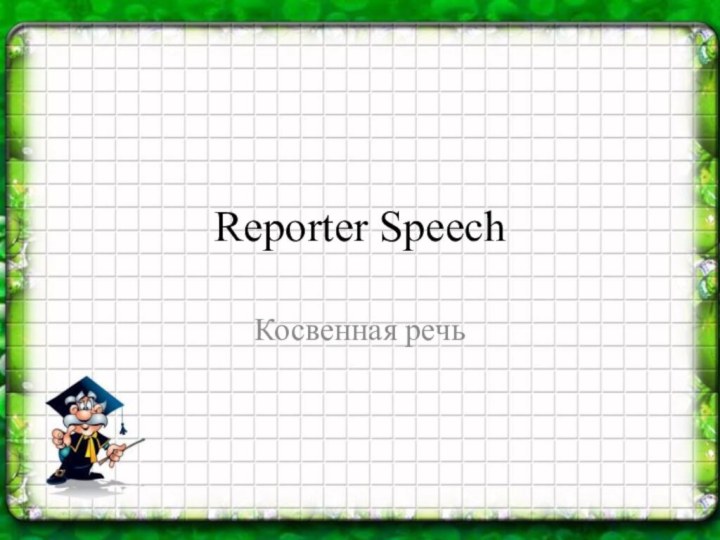
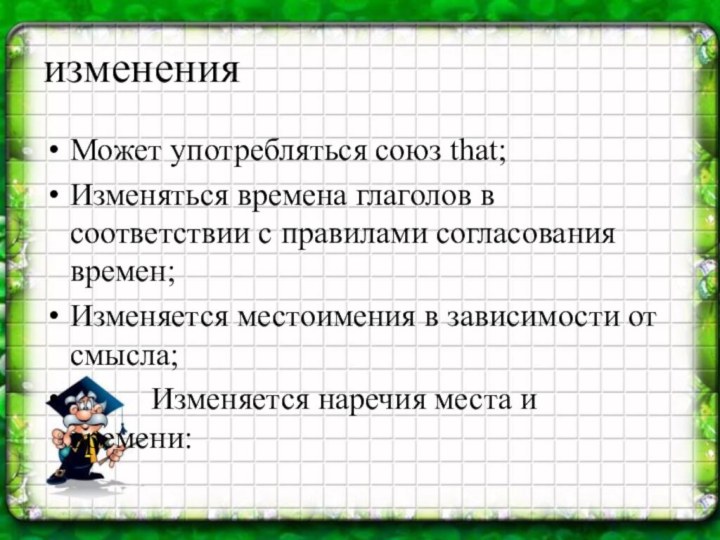
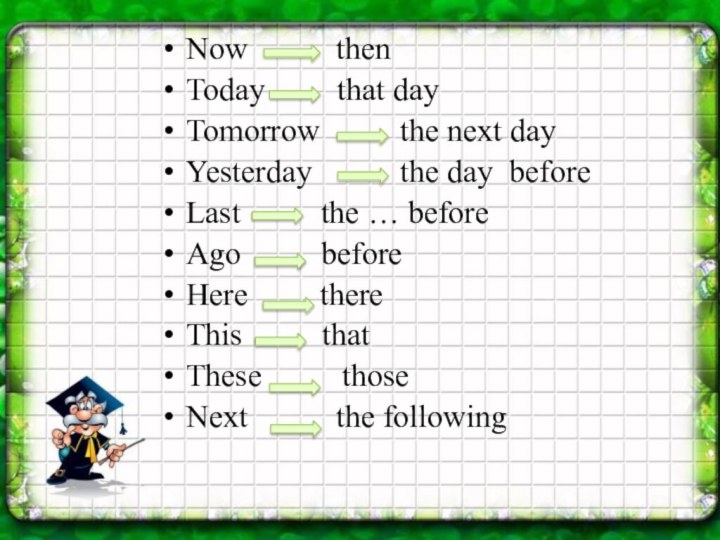
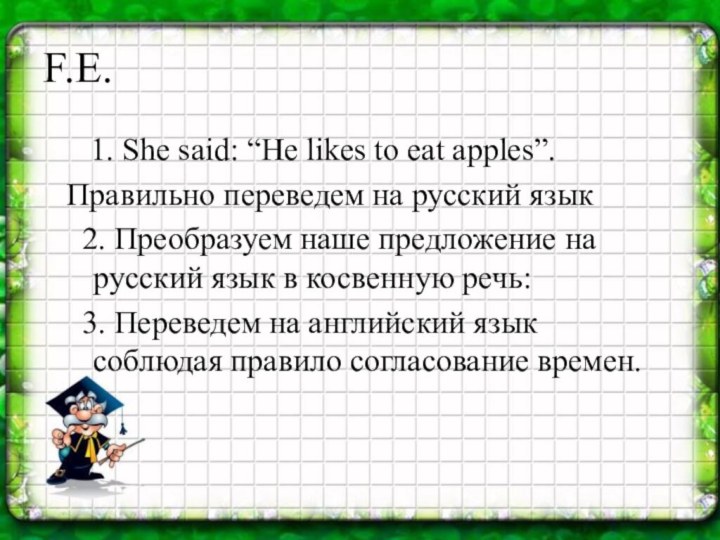
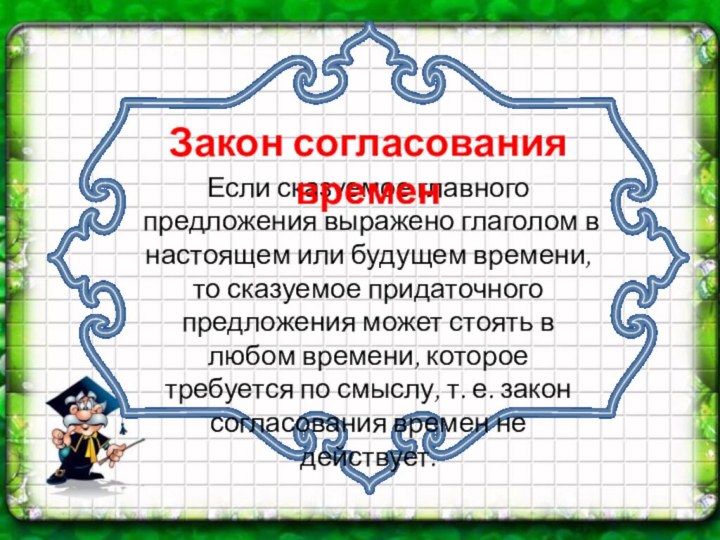
![Косвенная речь в английском языке [tense] (tense)](/img/tmb/6/551182/8d1a9efc641ea07f4e30f9e1e6cdef40-720x.jpg)
![Косвенная речь в английском языке IF [ P.S. or P.C. or P.P. or P.P.C.]](/img/tmb/6/551182/90bc41c42cee6b95d4388f39e789e755-720x.jpg)
![Косвенная речь в английском языке Examples [I knew] (he was ill). Past](/img/tmb/6/551182/b3149c3b9f01f35b4880ce31901beb8b-720x.jpg)
![Косвенная речь в английском языке [Sally said] Past Simple](/img/tmb/6/551182/28d0b710d3e1157dc58f50e121462acf-720x.jpg)
![Косвенная речь в английском языке [You hadn't told me] Past Perfect](/img/tmb/6/551182/a76b3e9306cc38589d44bab6e73dd861-720x.jpg)
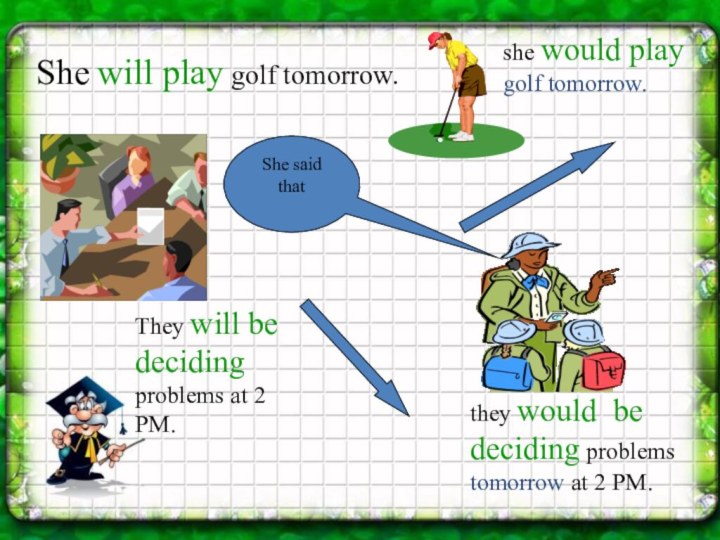
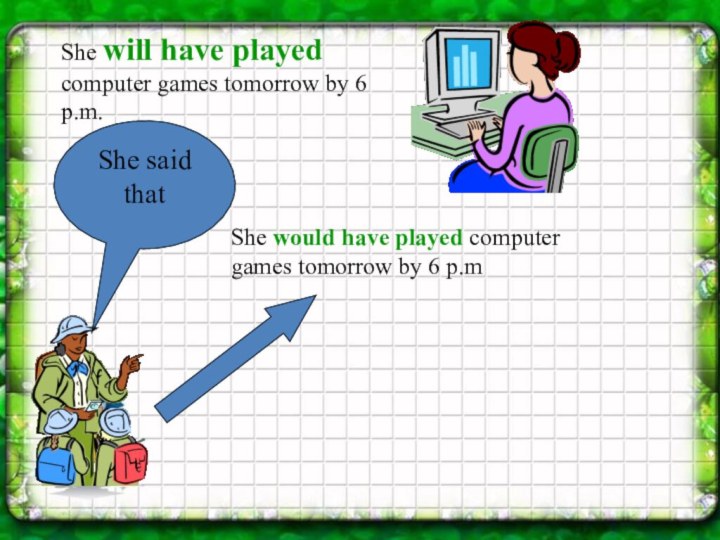
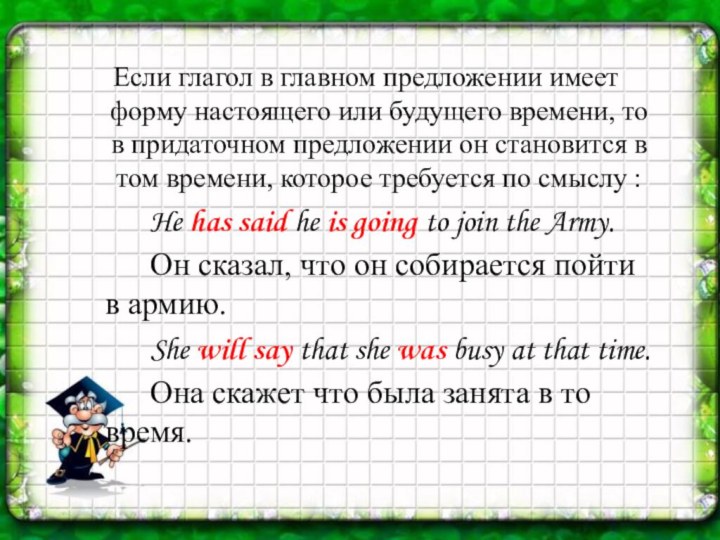
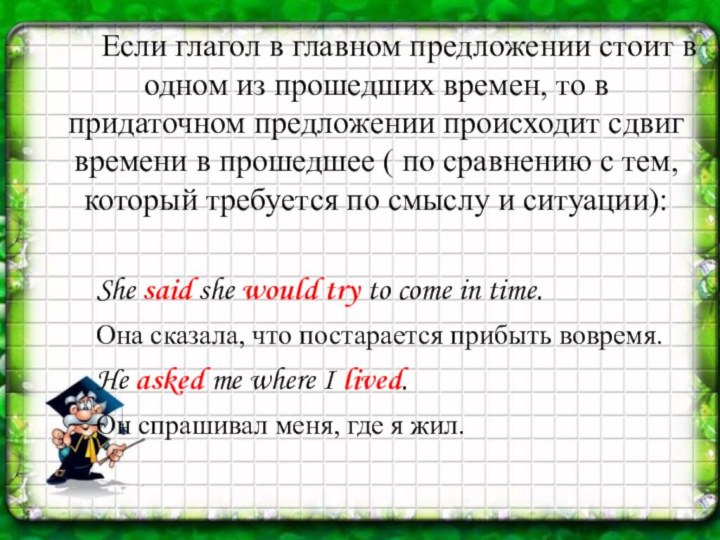
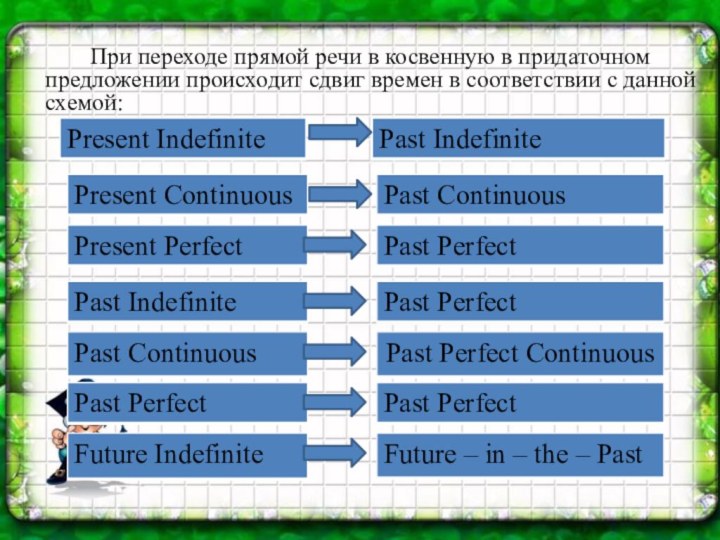
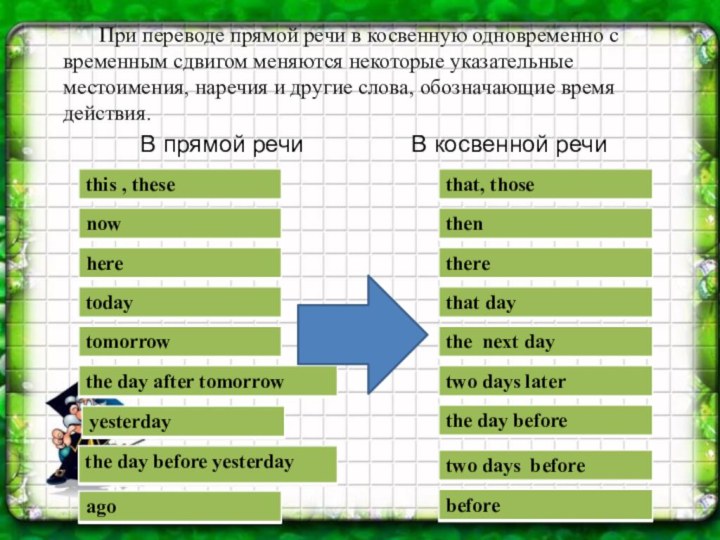
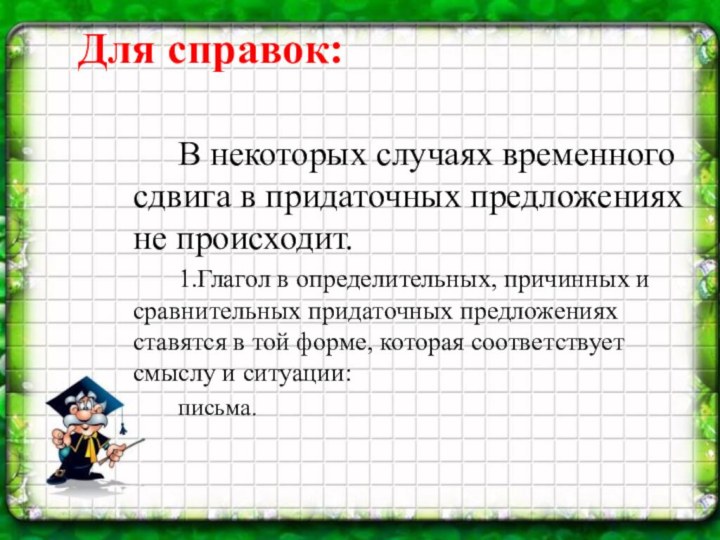
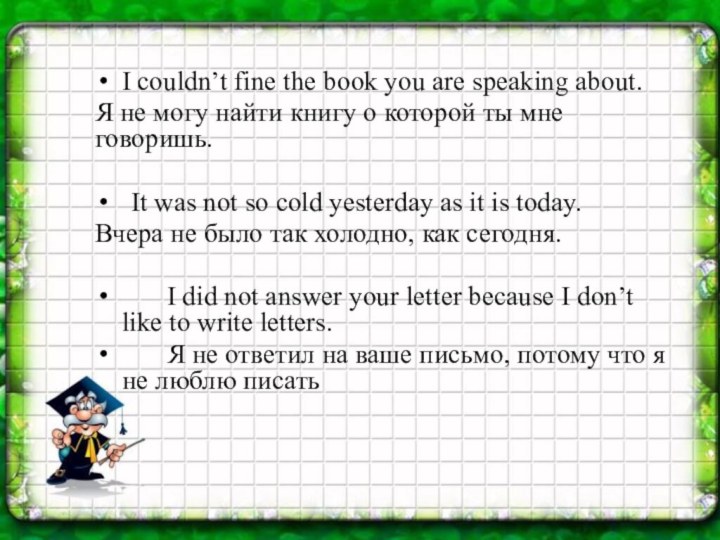
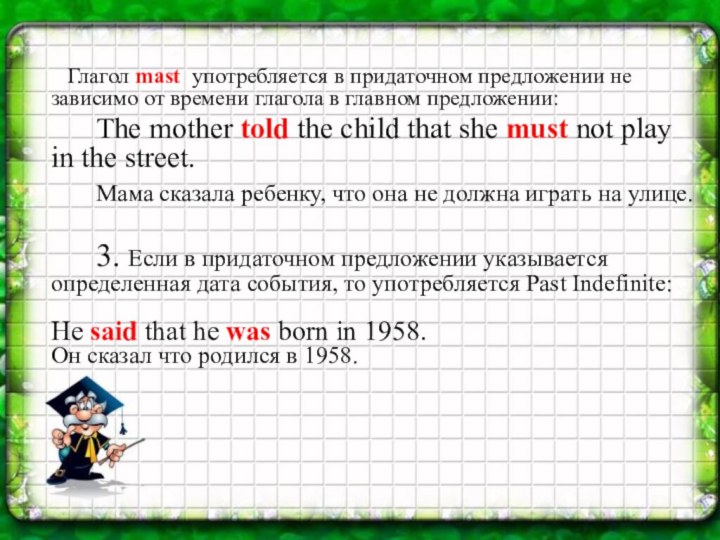
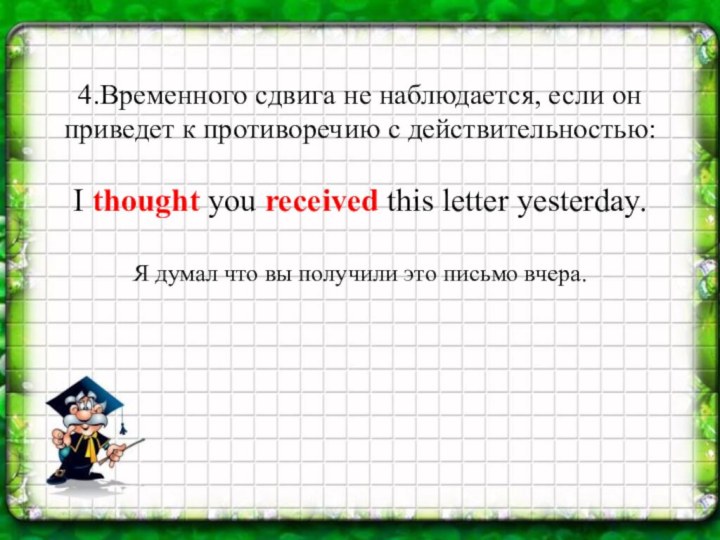
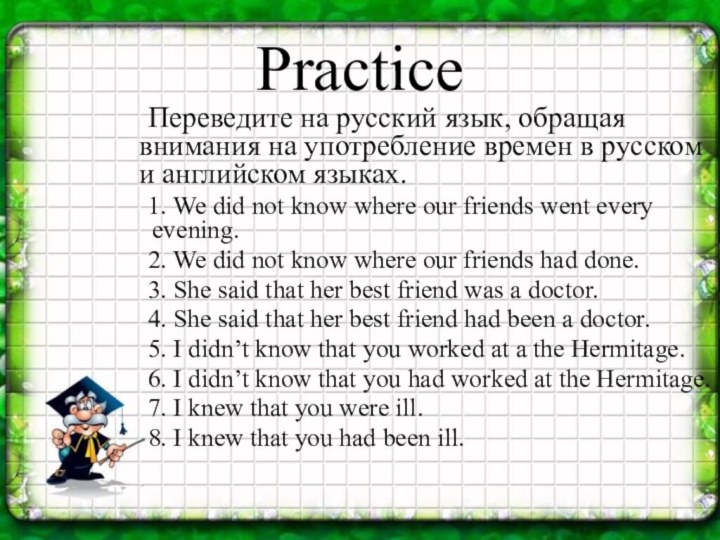
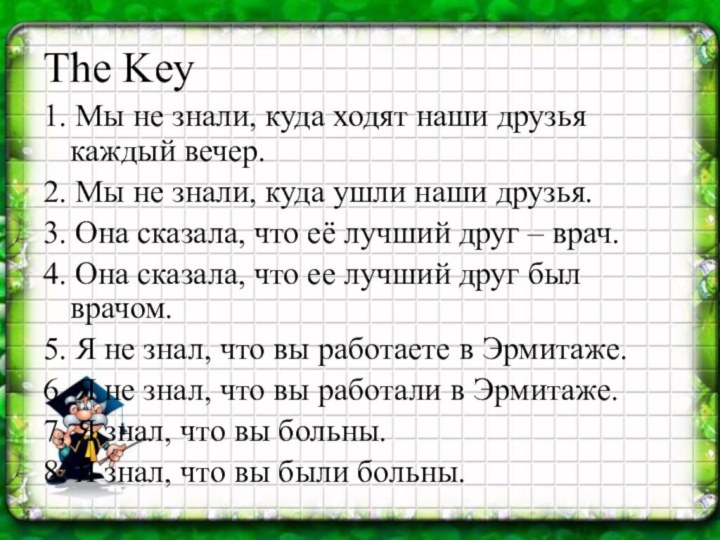
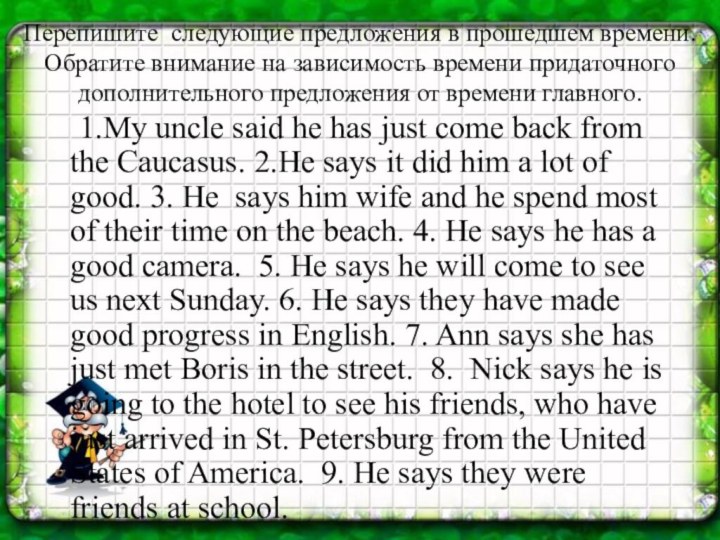
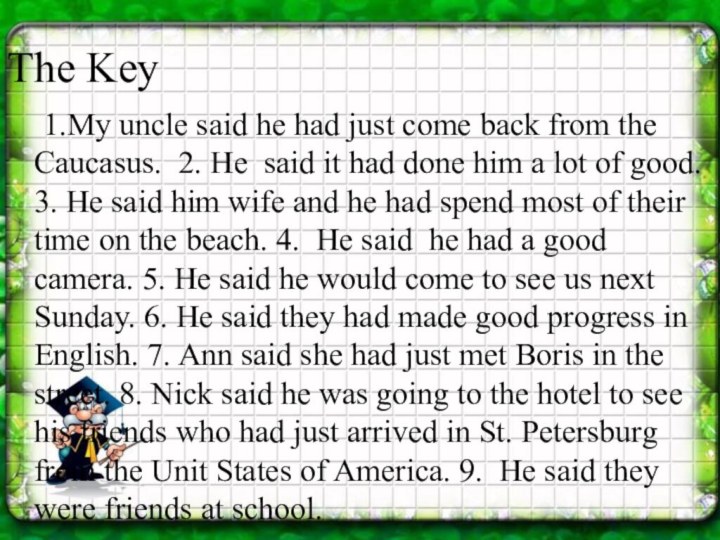
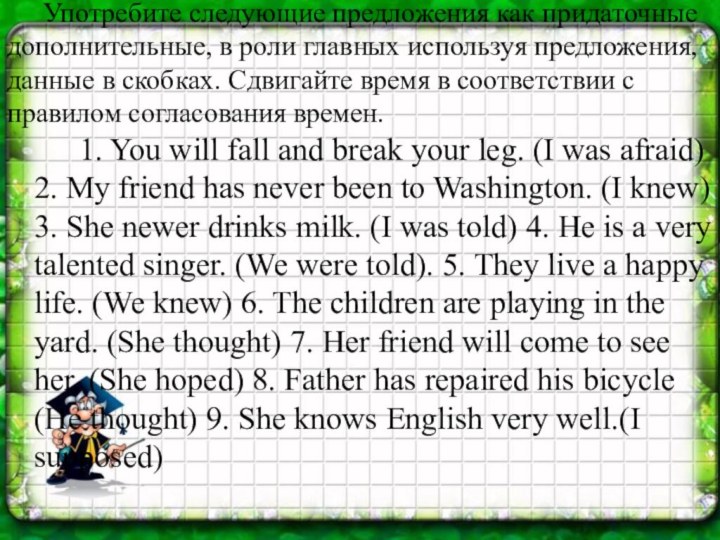
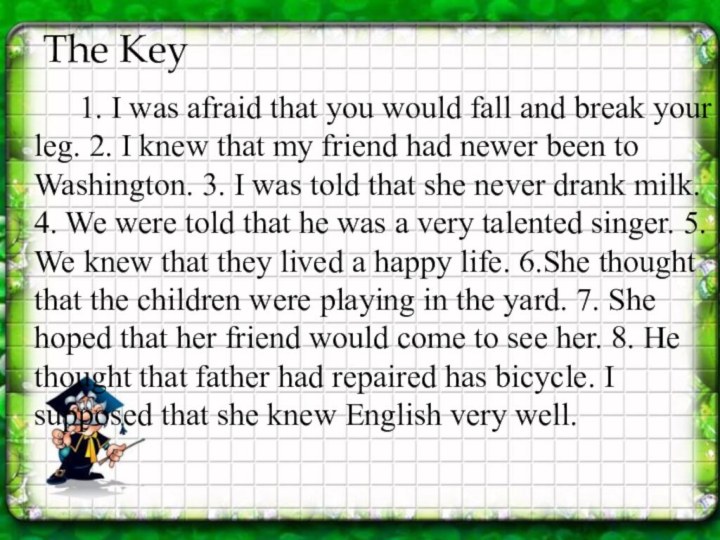
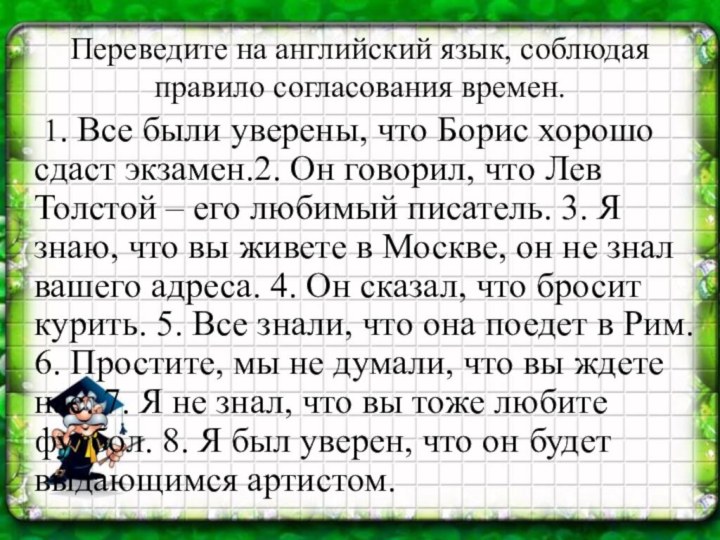
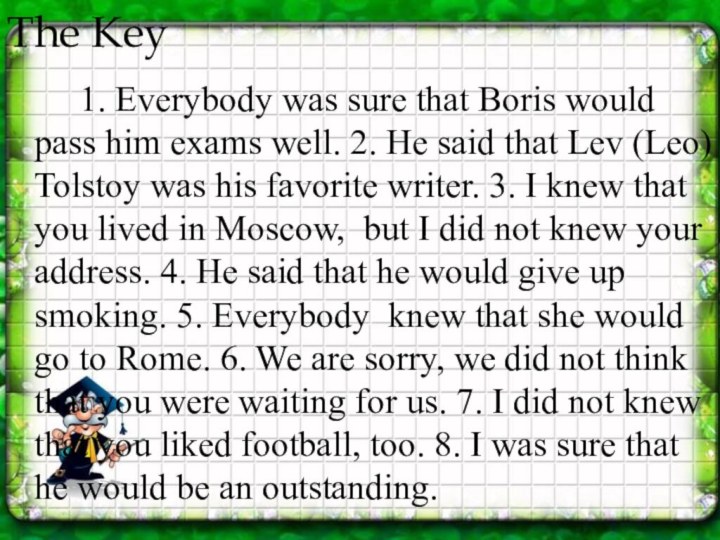
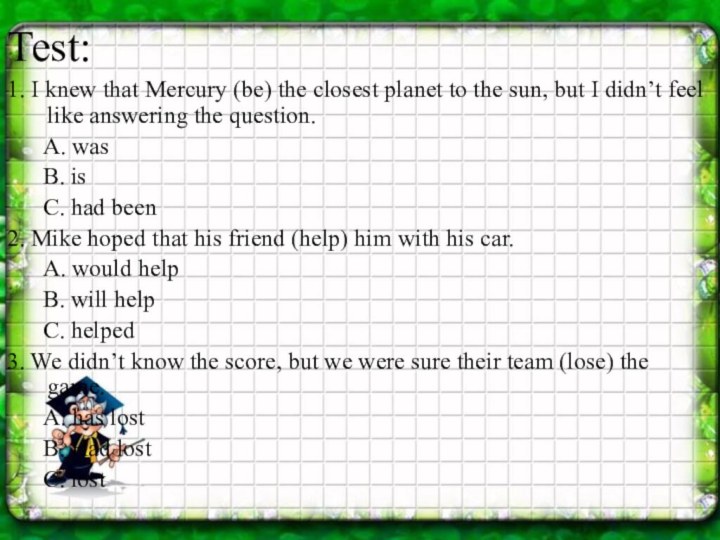
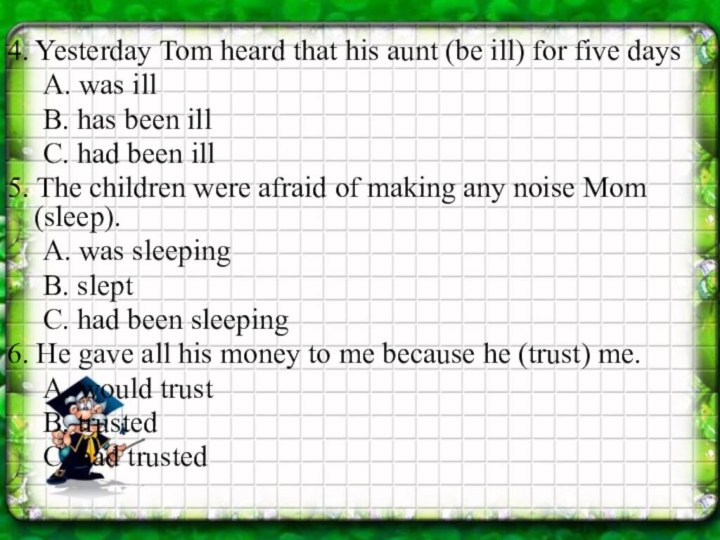
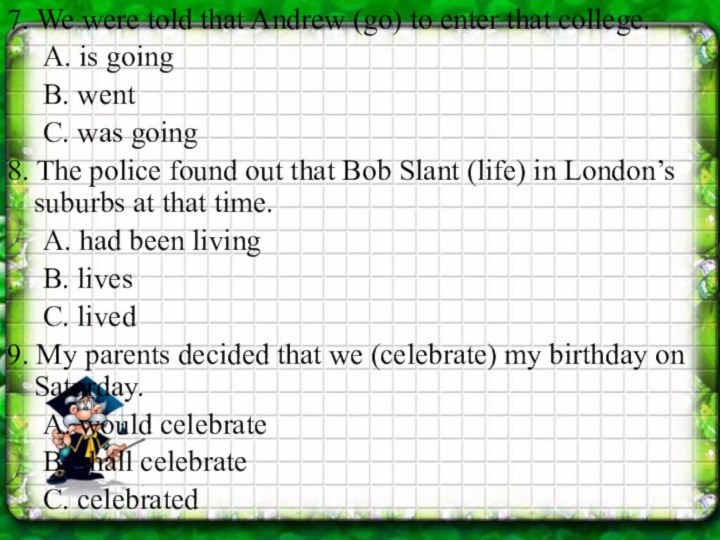
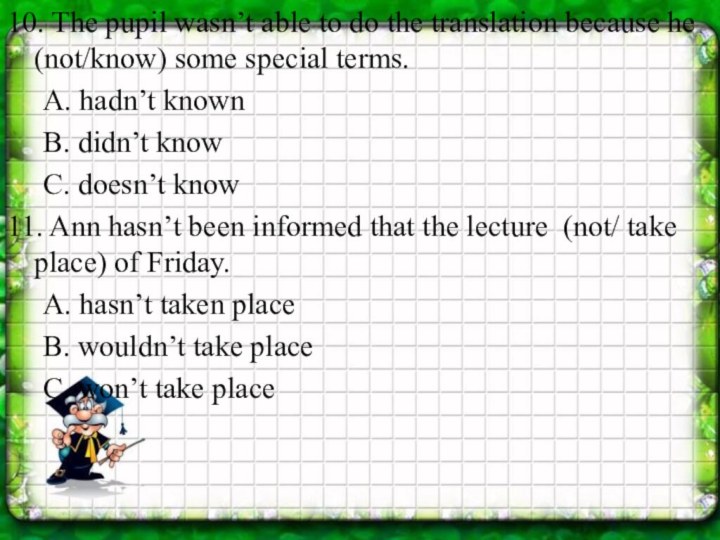
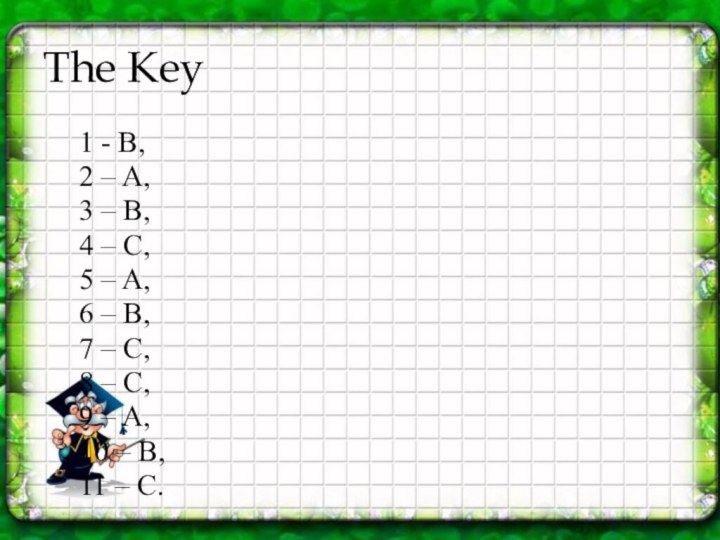
Слайд 2
изменения
Может употребляться союз that;
Изменяться времена глаголов в соответствии
с правилами согласования времен;
Изменяется наречия места и времени:
Слайд 3
Now then
Today
that day
Tomorrow
the next day Yesterday the day before
Last the … before
Ago before
Here there
This that
These those
Next the following
Слайд 4
F.E.
1. She said: “He likes to
eat apples”.
Правильно переведем на русский язык
2. Преобразуем наше
предложение на русский язык в косвенную речь: 3. Переведем на английский язык соблюдая правило согласование времен.
Слайд 5 Если сказуемое главного предложения выражено глаголом в настоящем
или будущем времени, то сказуемое придаточного предложения может стоять
в любом времени, которое требуется по смыслу, т. е. закон согласования времен не действует.Закон согласования времен
Слайд 7 IF [ P.S. or P.C. or
P.P. or P.P.C.] THEN (P.S. or P.C.
or P.P. or P.P.C. or Future -in the -Past )Слайд 11
She will play golf tomorrow.
They will be deciding problems at 2 PM.
She said that
she would play
golf tomorrow.
they would be deciding problems tomorrow at 2 PM.
Слайд 12 She will have played computer games tomorrow by
6 p.m.
She said that
She would have played
computer games tomorrow by 6 p.m
Слайд 13
Если глагол в главном предложении имеет форму настоящего
или будущего времени, то в придаточном предложении он становится
в том времени, которое требуется по смыслу :He has said he is going to join the Army.
Он сказал, что он собирается пойти в армию.
She will say that she was busy at that time.
Она скажет что была занята в то время.
Слайд 14 Если глагол в главном предложении стоит в одном
из прошедших времен, то в придаточном предложении происходит сдвиг
времени в прошедшее ( по сравнению с тем, который требуется по смыслу и ситуации):She said she would try to come in time.
Она сказала, что постарается прибыть вовремя.
He asked me where I lived.
Он спрашивал меня, где я жил.
Слайд 15
При переходе прямой речи в косвенную в придаточном
предложении происходит сдвиг времен в соответствии с данной схемой:
Слайд 16 При переводе прямой речи в косвенную одновременно с
временным сдвигом меняются некоторые указательные местоимения, наречия и другие
слова, обозначающие время действия.
Слайд 17
Для справок:
В некоторых случаях временного сдвига в придаточных
предложениях не происходит.
1.Глагол в определительных, причинных и сравнительных придаточных
предложениях ставятся в той форме, которая соответствует смыслу и ситуации:письма.
Слайд 18 I couldn’t fine the book you are speaking
about.
Я не могу найти книгу о которой ты
мне говоришь. It was not so cold yesterday as it is today.
Вчера не было так холодно, как сегодня.
I did not answer your letter because I don’t like to write letters.
Я не ответил на ваше письмо, потому что я не люблю писать
Слайд 19
Глагол mast употребляется в придаточном предложении не
зависимо от времени глагола в главном предложении:
The mother
told the child that she must not play in the street.Мама сказала ребенку, что она не должна играть на улице.
3. Если в придаточном предложении указывается определенная дата события, то употребляется Past Indefinite: He said that he was born in 1958. Он сказал что родился в 1958.
Слайд 20 4.Временного сдвига не наблюдается, если он приведет к
противоречию с действительностью: I thought you received this letter yesterday.
Я думал что вы получили это письмо вчера.
Слайд 21
Practice
Переведите на русский язык, обращая внимания на употребление
времен в русском и английском языках.
1. We did not
know where our friends went every evening.2. We did not know where our friends had done.
3. She said that her best friend was a doctor.
4. She said that her best friend had been a doctor.
5. I didn’t know that you worked at a the Hermitage.
6. I didn’t know that you had worked at the Hermitage.
7. I knew that you were ill.
8. I knew that you had been ill.
Слайд 22
The Key
1. Мы не знали, куда ходят наши
друзья каждый вечер.
2. Мы не знали, куда ушли наши
друзья.3. Она сказала, что её лучший друг – врач.
4. Она сказала, что ее лучший друг был врачом.
5. Я не знал, что вы работаете в Эрмитаже.
6. Я не знал, что вы работали в Эрмитаже.
7. Я знал, что вы больны.
8. Я знал, что вы были больны.
Слайд 23 Перепишите следующие предложения в прошедшем времени. Обратите внимание
на зависимость времени придаточного дополнительного предложения от времени главного.
1.My
uncle said he has just come back from the Caucasus. 2.He says it did him a lot of good. 3. He says him wife and he spend most of their time on the beach. 4. He says he has a good camera. 5. He says he will come to see us next Sunday. 6. He says they have made good progress in English. 7. Ann says she has just met Boris in the street. 8. Nick says he is going to the hotel to see his friends, who have just arrived in St. Petersburg from the United States of America. 9. He says they were friends at school.
Слайд 24
The Key
1.My uncle said he had just come
back from the Caucasus. 2. He said it had
done him a lot of good. 3. He said him wife and he had spend most of their time on the beach. 4. He said he had a good camera. 5. He said he would come to see us next Sunday. 6. He said they had made good progress in English. 7. Ann said she had just met Boris in the street. 8. Nick said he was going to the hotel to see his friends who had just arrived in St. Petersburg from the Unit States of America. 9. He said they were friends at school.Слайд 25 Употребите следующие предложения как придаточные дополнительные, в роли
главных используя предложения, данные в скобках. Сдвигайте время в
соответствии с правилом согласования времен. 1. You will fall and break your leg. (I was afraid) 2. My friend has never been to Washington. (I knew) 3. She newer drinks milk. (I was told) 4. He is a very talented singer. (We were told). 5. They live a happy life. (We knew) 6. The children are playing in the yard. (She thought) 7. Her friend will come to see her. (She hoped) 8. Father has repaired his bicycle (He thought) 9. She knows English very well.(I supposed)
Слайд 26
The Key
1. I was afraid that you would
fall and break your leg. 2. I knew that
my friend had newer been to Washington. 3. I was told that she never drank milk. 4. We were told that he was a very talented singer. 5. We knew that they lived a happy life. 6.She thought that the children were playing in the yard. 7. She hoped that her friend would come to see her. 8. He thought that father had repaired has bicycle. I supposed that she knew English very well.
Слайд 27
Переведите на английский язык, соблюдая правило согласования времен.
1.
Все были уверены, что Борис хорошо сдаст экзамен.2. Он
говорил, что Лев Толстой – его любимый писатель. 3. Я знаю, что вы живете в Москве, он не знал вашего адреса. 4. Он сказал, что бросит курить. 5. Все знали, что она поедет в Рим. 6. Простите, мы не думали, что вы ждете нас. 7. Я не знал, что вы тоже любите футбол. 8. Я был уверен, что он будет выдающимся артистом.
Слайд 28
The Key
1. Everybody was sure that Boris would
pass him exams well. 2. He said that Lev
(Leo) Tolstoy was his favorite writer. 3. I knew that you lived in Moscow, but I did not knew your address. 4. He said that he would give up smoking. 5. Everybody knew that she would go to Rome. 6. We are sorry, we did not think that you were waiting for us. 7. I did not knew that you liked football, too. 8. I was sure that he would be an outstanding.
Слайд 29
Test:
1. I knew that Mercury (be) the
closest planet to the sun, but I didn’t feel
like answering the question.A. was
B. is
C. had been
2. Mike hoped that his friend (help) him with his car.
A. would help
B. will help
C. helped
3. We didn’t know the score, but we were sure their team (lose) the game.
A. has lost
B. Had lost
C. lost
Слайд 30
4. Yesterday Tom heard that his aunt (be
ill) for five days
A. was ill
B. has been
illC. had been ill
5. The children were afraid of making any noise Mom (sleep).
A. was sleeping
B. slept
C. had been sleeping
6. He gave all his money to me because he (trust) me.
A. would trust
B. trusted
C. had trusted
Слайд 31 7. We were told that Andrew (go) to
enter that college.
A. is going
B. went
C. was
going 8. The police found out that Bob Slant (life) in London’s suburbs at that time.
A. had been living
B. lives
C. lived
9. My parents decided that we (celebrate) my birthday on Saturday.
A. would celebrate
B. shall celebrate
C. celebrated
Слайд 32 10. The pupil wasn’t able to do the
translation because he (not/know) some special terms.
A. hadn’t
known B. didn’t know
C. doesn’t know
11. Ann hasn’t been informed that the lecture (not/ take place) of Friday.
A. hasn’t taken place
B. wouldn’t take place
C. won’t take place

